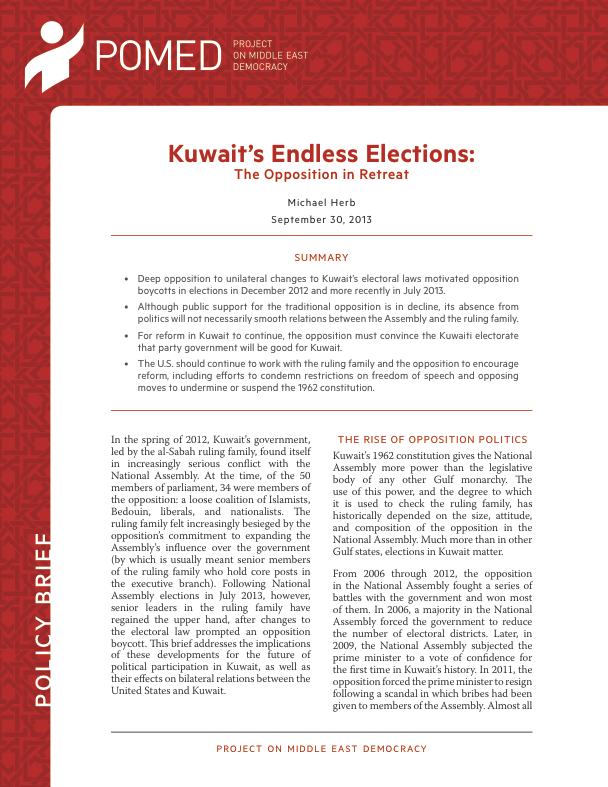For a full text copy of the brief, click here.
 In the spring of 2012, Kuwait’s government, led by the al-Sabah ruling family, found itself in increasingly serious conflict with the National Assembly. At the time, of the 50 members of parliament, 34 were members of the opposition: a loose coalition of Islamists, Bedouin, liberals, and nationalists.
In the spring of 2012, Kuwait’s government, led by the al-Sabah ruling family, found itself in increasingly serious conflict with the National Assembly. At the time, of the 50 members of parliament, 34 were members of the opposition: a loose coalition of Islamists, Bedouin, liberals, and nationalists.
The ruling family felt increasingly besieged by the opposition’s commitment to expanding the Assembly’s influence over the government (by which is usually meant senior members of the ruling family who hold core posts in the executive branch). Following National Assembly elections in July 2013, however, senior leaders in the ruling family have regained the upper hand, after changes to the electoral law prompted an opposition boycott. This brief addresses the implications of these developments for the future of political participation in Kuwait, as well as their effects on bilateral relations between the United States and Kuwait.
POLICY RECOMMENDATIONS
- The U.S. should continue to support the 1962 constitution, while discouraging unconstitutional attempts to suspend it. U.S. policymakers must send a consistent message to the ruling family that it will oppose any effort to suspend the National Assembly, or to dilute the Assembly’s ability to remove confidence in ministers.
- The U.S. must work with the Kuwaiti government to address the status of Kuwaiti citizens currently being detained at Guantanamo Bay. The U.S. still holds two Kuwaiti citizens in indefinite detention, though the emir himself has made it clear he wants them returned to Kuwait.
- The U.S. must continue to condemn efforts on the part of the ruling family to stifle dissent through restrictions on freedom of speech.
- U.S. officials should work closely with the government of Kuwait to reform the country’s antiquated visa system. The State Department’s report on Trafficking in Persons identifies deep and serious problems with Kuwait’s visa system, including the selling of visas to workers, violations of contractual terms, and inadequacy of redress.
- The U.S. Embassy in Kuwait City should more seriously engage with Kuwait’s bidoon.
Michael Herb is associate professor of political science at Georgia State University, in Atlanta. He is currently writing a book on political participation, economic development, and labor markets in the Gulf monarchies. He is the author of All in the Family: Absolutism, Revolution, and Democracy in the Middle Eastern Monarchies and maintains the Kuwait Politics Database. He received Fulbright awards to study in Kuwait in 1993 and 2007.
Photo credit: Ra’ed Qutena, Flickr




